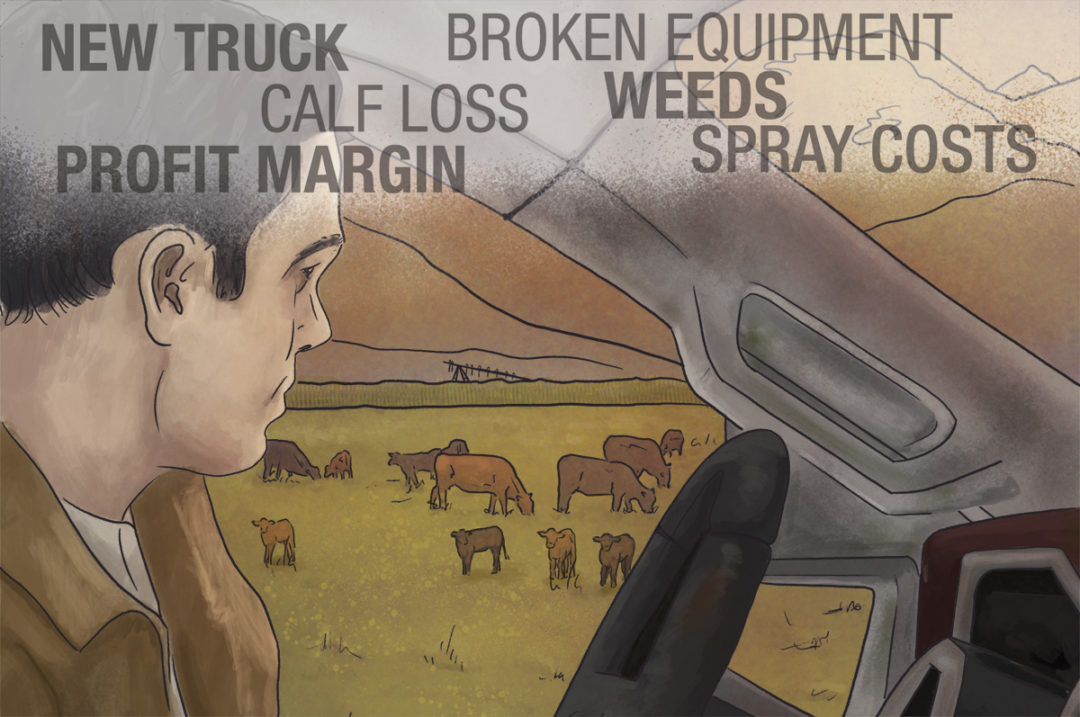Picture this: A rancher is driving his truck through a field spanning as far as the eye can see. He’s checking his cow herd again, and it’s nearing the end of calving season. The most beautiful deep-orange sunset you’ve ever seen serves as a backdrop as he watches the newborn calves frolicking through acres of wide-open space. On the outside, it looks like a scene from a magazine, picture perfect.
What you can’t see from the outside tells a different story. The rancher is getting nervous because he already lost a few calves this season, and his profit margin is getting slimmer with each loss. He sees the broadleaf weeds peeking up through the grass and wonders how much it will cost to spray this year. He hears the engine in his truck puttering; it’s 20 years old and has 258,000 miles on it but a newer truck is definitely not in the budget after the losses from last year’s drought. This reminds him that the pivot in the cornfield still needs new parts …
Unique challenges
It’s no secret farmers and ranchers face unique challenges that 98% of the U.S. population can’t relate to. The cattle market is volatile, there’s a nationwide drought, the $400,000 combine broke down during harvest, fertilizer prices just doubled and the list goes on and on and on. These unique stressors are contributors to a mental health crisis in agriculture and rural areas across the country. Farmers and ranchers are problem-solvers by trade, they’re going to grind it out and work through any problem that crosses their path. When it comes to mental health struggles, naturally, many farmers and ranchers feel like they should be able to fix it themselves. But what happens when the load becomes too much to bear?
Farmer suicide rates are three to five times higher than the national average. Along with unique stressors contributing to mental health struggles, farmers and ranchers also face unique barriers to mental health care. Accessibility and stigma act as significant barriers when addressing mental health concerns. A 2018 study found 95% of mental health professionals in rural areas cannot meet the mental health needs of their communities. If residents are lucky enough to get access to a mental health professional in their area, other accessibility factors often bar them from following through with seeking care, such as taking time off work, finances and insurance, internet access and geographic isolation. Working in agriculture, producers are also usually somewhat socially isolated. This means there are fewer people around to observe warning signs that a producer is struggling, making it even more challenging to get the help that they need.
Warning signs
Although the agricultural industry has made great strides in addressing mental health, a stigma still lingers, compounding accessibility challenges. Asking for help is often seen as a sign of weakness, so the silent struggle with mental health continues. How can we encourage change? Recognizing the signs of someone struggling with mental health is an important first step.
7 warning signs to watch for
- Changes in routine: Producers may stop attending meetings or community activities or quit stopping by the co-op for their morning cup of coffee.
- Decline in care of animals: Livestock and pet care may decline.
- Increase in illness: Producers may experience more chronic illnesses or physical ailments.
- Increase in farm accidents: Loss of ability to concentrate and other physical ailments increase the risk of farm accidents.
- Decline in farm’s appearance: Buildings, grounds and surrounding acreage may degrade as producers no longer take pride in their operation.
- Signs of stress within the family: Often, mental health struggles impact families too. Children may decline in academic performance, and family members may appear less social or show signs of abuse or neglect.
- Decreased interest: Producers may become less willing to commit to future activities and events.
Although you may feel uncomfortable starting a conversation addressing these signs, encouraging open conversations can make a big difference in the life of someone who is struggling with their mental health. You can start by:
- Acknowledging what they’re going through: One way to start a conversation is to address the elephant in the room. Gently address some of the changes you’ve noticed, the tough situations they may be going through and ask how they’re doing.
- Listening: There is no quick and easy fix for those struggling with mental health. You are not going to be able to fix the natural disasters, financial pressures or markets they face, but you can listen as producers talk through their concerns. Often, the first step to admitting there is a problem is talking about it out loud to someone.
- Showing genuine care and empathy: Sometimes the most powerful healing comes from persistently showing you care and are willing to help. As the saying goes, “You can lead a horse to water, but you can’t make him drink.” The same is true for those in need of mental health care. One conversation addressing your concerns won’t magically fix everything, but showing consistent support over time allows those who are struggling to gradually accept and address their current mental health state.
Where do we go from here?
To cultivate a healthier mindset within the agricultural industry, initiatives promoting awareness, education and destigmatization can act as the seeds of change. As an industry, we can start by:
- Cultivating conversations: Farmers, agricultural organizations and communities can come together to share their experiences, challenges and coping strategies. By normalizing these conversations, we create a space where mental health is acknowledged, respected and supported.
- Promoting resilience: Resilience is inherent in agriculture, but part of true resilience is recognizing when it's time to seek help. Educational programs can be implemented to teach farmers resilience not only in the face of external challenges but also in caring for their mental well-being.
- Establishing community support networks: Establishing support networks within agricultural communities is vital. Local support groups, online communities, mental health awareness campaigns and community-driven initiatives can provide a safe place for farmers to open up and know they are not alone in their struggles.
- Incorporating mental health in policies: Governments and agricultural organizations must recognize the significance of mental health in the agricultural sector. Including mental health considerations in policies, providing funding for mental health services and integrating mental health education into agricultural training programs can contribute to a more sustainable approach to farmer well-being.
Not a weakness, but a strength
Being a farmer or rancher comes with constant stress, isolation, long hours, hard work and pressures most of the country will never understand. Sometimes it feels like everything is working against you. Farmers can easily get trapped in the mindset that they can ignore mental health battles – just work harder and they’ll go away. For many farmers and ranchers, struggles with mental health can be persistent, and the first step to learning how to manage these struggles is admitting they exist. It’s not a sign of weakness to ask for help, but rather a sign of strength. It takes strength to admit you’re struggling, it takes strength to seek help and it takes strength to support someone you see is struggling.
If you or someone you know is struggling with mental health, the road to healing starts with a conversation. For more national and local mental health resources, check out the Farm State of Mind resource directory.










